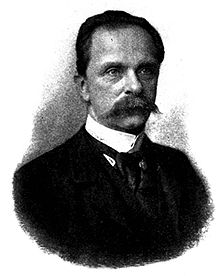Themistocles Gluck
Themistocles Gluck (born November 30, 1853 in Jassy , Principality of Moldova , † April 25, 1942 in Berlin ) was a German surgeon .
Live and act
The parents had left Germany out of grief over the death of two children and started a new life in Jassy in Romania. Themistocles was born here, who got his name from a Greek godfather , a friend of his parents. The father, a doctor, later became the personal doctor of the Romanian King Charles I. For further training, the parents sent the son to a German school in 1864, to the Maria-Magdalenen-Gymnasium in Breslau . After graduating from high school in 1873 (together with Felix Auerbach ) he studied medicine in Leipzig and Berlin . Rudolf Virchow , Bernhard von Langenbeck and Ernst von Bergmann were his teachers. After taking the state examination in 1876 , he took part in the Russo-Ottoman War as a military doctor . He then worked in Berlin from 1878 to 1884 as an assistant to Langenbeck and Bergmann. In 1882 he qualified as a professor for surgery at the age of 29 .
In 1890 he was appointed chief surgeon at the new Kaiser and Kaiserin Friedrich Children's Hospital in Berlin-Wedding . In 1893 he was elected a member of the Leopoldina . Until 1924 he worked at the Wedding Hospital. Gluck's fundamental and forward-looking research on the treatment of vascular, bone, muscle, tendon and nerve defects through suturing, transplantation and plastic prostheses was initially rejected by established colleagues. Already in 1890 he had a total knee replacement from Ivory using rosin and gypsum implanted . Gluck conceived the cement fixation of prostheses, an idea that John Charnley picked up and implemented a good 50 years later.
His wife was a great support to him. Theodor Billroth , a surgeon and music lover like Gluck, wrote to his friend Johannes Brahms about Gluck: Every researcher was basically a kind of artist. With rich imagination and childlike mind. Science and art draw from one source.
From 1874 Gluck was a member of the Corps Saxonia Leipzig .
Honors
For his work on nerve sutures and nerve regeneration, he received the 1st State Prize from the Berlin University . The French surgeons Louis Léopold Ollier and Jules Péan recognized Gluck's importance as early as the 1890s. With his larynx operation he achieved world renown. Even so, it took a long time for him to gain due academic recognition as a non-university surgeon. It was not until he was 70 years old (1922) that he was appointed associate professor and was even proposed for the Nobel Prize (unsuccessful because his work was considered too old at the time). The German Society for Surgery awarded him honorary membership. Well-known surgeons such as Hermann Kümmell and Erwin Payr in Germany now also acknowledged Gluck and his ideas. Since 2000, the German Society for Orthopedics and Orthopedic Surgery has awarded the Themistocles-Gluck Prize for Endoprosthetics every year.
Works (selection)
- About neuroplasty by way of transplantation . In: Archives for Clinical Surgery . Volume 25, 1880, pp. 606-616
- About transplantation, regeneration and inflammatory neoplasm . In: Berliner Klinische Wochenschrift . Volume 18, 1881, p. 529 ff.
- The invagination method of osteoplasty and arthroplasty . In: Berlin clinical weekly . Volume 19, 1890, pp. 732-736
- Lecture on the positive results obtained by modern surgical experiment regarding the suturing and the replacement of defects in higher tissues . In: Archives for Clinical Surgery . Volume 41, 1891 6, p. 15
- Autoplasty - transplantation - implantation of foreign bodies . In: Berliner Klinische Wochenschrift . Volume 27, 1890, pp. 421-427
- The development of pulmonary surgery . In: Archives for Clinical Surgery . Volume 83, 1907, pp. 581-601
- D. Wessinghage: Themistocles Gluck - From organ extirpation to joint replacement . In: Deutsches Ärzteblatt . Volume 33, 1995
literature
- Gluck, Themistocles. In: Robert Volz: Reich manual of the German society . The handbook of personalities in words and pictures. Volume 1: A-K. Deutscher Wirtschaftsverlag, Berlin 1930, DNB 453960286 , pp. 553–554.
- Jürgen Probst: Themistokles Gluck (1853-1942) - a pioneer of German surgery. In: DGU - Mitteilungen und Nachrichten 56, 2007, pp. 64–66.
- Fritz Lange: Themistocles Gluck . In: Munich Medical Weekly . Volume 80, 1933
- Wilhelm Katner: Gluck, Themistocles. In: New German Biography (NDB). Volume 6, Duncker & Humblot, Berlin 1964, ISBN 3-428-00187-7 , p. 469 ( digitized version ).
- Th. Gluck, self-presentation . Leipzig 1928
- Julius Pagel : Gluck, Themistocles . In: Biographical lexicon of outstanding doctors of the nineteenth century. Urban & Schwarzenberg, Berlin / Vienna 1901, Sp. 602–604 .
Web links
- Literature by and about Themistocles Gluck in the catalog of the German National Library
- The prehistory of total joints - Themistocles Gluck and Jules Emile Péan pioneers of endoprosthetics
- Ariane Hoffmann: November 30th, 1853 - Birthday of Themistocles Gluck WDR ZeitZeichen from November 30th, 2013 (Podcast)
Individual evidence
- ^ Kösener corps lists 1910, 154 , 496
- ↑ Volker Mrasek : The forever nominees. In: Current research (broadcast on DLF ). December 7, 2016, accessed December 20, 2016 .
| personal data | |
|---|---|
| SURNAME | Gluck, Themistocles |
| BRIEF DESCRIPTION | German doctor and surgeon |
| DATE OF BIRTH | November 30, 1853 |
| PLACE OF BIRTH | Jassy , Romania |
| DATE OF DEATH | April 25, 1942 |
| Place of death | Berlin |
